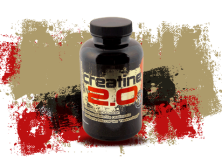
Creatine increases the amount of fluid in the body’s cells. Some trainers are still worried that creatine makes cells absorb so much water that there is not enough fluid available for other bodily functions, such as sweating. The researchers wanted to know whether this fear was grounded, so they performed an experiment in which they gave athletes a sports drink containing a placebo four times a day for a week. A week later the athletes were given a drink four times a day that contained five grams of creatine. At the end of each week the subjects cycled for half an hour and then had to sprint six times for ten-second bursts.
At the end of the week when they took creatine, the athletes were 1.3 kg heavier and they performed slightly better. But the creatine supplement did not result in a change in the amount of blood plasma or a higher body temperature. “Ingestion of creatine for six days does not produce any different thermoregulatory responses to intermittent sprint exercise”, the researchers concluded.
These findings are not entirely new. In 2005 American researchers at the Ohio Research Group in Nutrition published the results of a study which showed that athletes did not experience problems with creatine at high temperatures. [Nutrition. 2005 Mar;21(3):301-7.] In that study, sixteen subjects were given twenty grams of creatine for five days in a row. Afterwards they had to cycle at 55 percent of their VO2max at a temperature of 39 degrees Celsius. The researchers measured the subjects’ body temperature while they cycled. The researchers did the same test after the subjects had taken a placebo as well. The graph below shows the effect of the supplement on the subjects’ body temperature.
The dotted line represents the placebo group, and the solid line represents the creatine group.
Why creatine does not interfere with the body’s thermoregulation – i.e. sweating – is explained by a piece of basic research, also done by Americans, published in 2003 in the Journal of Athletic Training. [J Athl Train. 2003 Jan–Mar; 38(1): 44–50.]
According to this study, creatine does make the body retain more fluid, but the cells themselves absorb proportionally as much extra fluid as do the spaces between the cells. The researchers discovered this when they did a trial with thirty men and women: in the first week they gave the subjects a daily dose of twenty grams of creatine, and this was followed by five grams a day for three weeks. At the end of the period they used isotopes to measure how much fluid the body retained – and where the fluid was. The table below summarises the research results.
The total amount of fluid in the body rose, and the increase was statistically significant. The amount of moisture in the cells also increased, but this increase was not statistically significant. It is therefore unlikely that creatine supplements interfere with the body’s sweating mechanism.
Sources:
J Strength Cond Res. 2007 Aug;21(3):655-60.



